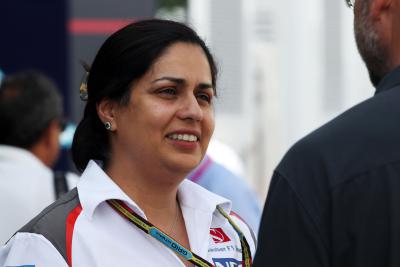Kaltenborn: F1 not too big to fail
Monisha Kaltenborn has warned that F1 needs to look at its commercial model because it is not too big to fail as a sport.
Caterham's plight highlights how tough the financial situation is for many teams on the grid, with Sauber open about its own recent financial struggles. Kaltenborn told Crash.net exclusively that just because F1 has been successful up to now it has to be willing to change the way funds are distributed to protect itself in the future.
"I don't think it is fundamentally flawed because it is this very model which has got us to where we are," Kaltenborn said. "So it must have been right that we can get to the level we are today financially and even from the reach out we have today and the importance we play today as a sport. What I think we need to reconsider is the circumstances today the sport is in. I believe it's going to get - even for the commercial rights holder - more and more difficult to maintain this kind of a financial level.
"We are seeing that with the promoters; how fewer spectators are coming in; we're seeing what other sports are maybe doing, they're catching up, more viewers going there, maybe even more companies going there to sponsor. That's what we have to look at and be careful that we're not overtaken somewhere there. I don't think we should have the attitude that we're too big to fail so let's just continue."
While Kaltenborn would like to see an external review to understand where the sport can improve, she says the primary focus should be on protecting the existing teams.
"We have to look at the sport, maybe get someone to identify where the risks are, where we maybe already had a negative impact and then try to solve that. Social media is definitely one aspect but it's not an aspect where you make millions. I think for people to believe when they say we're not that active in that, it's not leading automatically and instantly that we're losing this massive share of revenue there.
"It's something you have to build on and then you have to later see how you can commercialise it. So I think from the challenges we are facing we have to look at our model again and looking again at the overall picture to make sure that we can maintain that diversity. That can be done, and the most important factor for that is a more equitable distribution of the funds."


![Johann Zarco, LCR, Honda RC213V, 2024 San Marino MotoGP, Misano, action [Gold & Goose]](https://cdn.crash.net/styles/thumbnail/s3/2024-09/GnG_1166323_HiRes.jpg?itok=vpgrU7Q4)

![Jack Miller, KTM Factory Racing, KTM RC16, San Marino MotoGP, Misano, action [Gold & Goose]](https://cdn.crash.net/styles/thumbnail/s3/2024-09/GnG_1167624_HiRes.jpg?itok=iz7mA4EQ)


![Fabio Quartararo, Monster Energy Yamaha Racing, Yamaha M1, 2024 MotoGP, Misano Test, action [Gold & Goose]](https://cdn.crash.net/styles/thumbnail/s3/2024-09/GnG_1168928_HiRes.jpg?itok=fcYSole_)
![Toprak Razgatlioglu, ROKiT BMW Motorrad, BMW M 1000 RR, Magny-Cours, WorldSBK [Gold & Goose]](https://cdn.crash.net/styles/thumbnail/s3/2024-09/GnG_1165133_HiRes.jpg?itok=GD5SVNVG)

